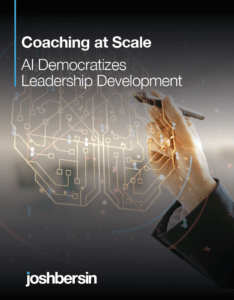AI-Enabled Coaching Is Hot. And There’s Lots More To Come.
It may sound odd, but the coaching market has caught fire. I’ve talked with coaching providers for more than 20 years and I always considered this a cottage industry. Lots of ex-CEOs and psychologists retire, go into business coaching, so companies hire them. And HR managers tend to hire who they know, who they like, and who has done good work in the past.
Now, thanks to AI, skills taxonomies, online video, and the power of social networks, you can find a coach for everyone. And while executive coaches charge thousands of dollars per hour, AI can match you to just the right coach at a fraction of the cost, bringing the power of experts to every manager, leader, and executive in your company.
This is a big and growing market. The International Coaching Federation estimates there are 71,000 coaches around the world, generating $2.9 Billion in total revenue in 2019, growing at 12-15% per year. Of this large number of coaches, 93% have received some form of accreditation and the average coach makes $47,000 per year. So this is a healthy marketplace, ripe for technology providers to aggregate, coordinate, and improve access.
Coaching really does matter, by the way. Study after study has shown that a coach (unlike a mentor, who is really your advocate) can be a teacher, a guide, and often a helpful psychologist. They increase confidence and professional skills and employees really appreciate the support. I used a coach to transition into the Deloitte partnership, and without him, I would have been totally lost.
Who are the big players? Right now we’re talking with several of them, including BetterUp (now valued at $1.7 billion), Torch (who recently merged with Everwise), Skillsoft (who just acquired Pluma), and a number of disruptors who offer AI and VR-based coaching. Mursion, for example, uses avatars for coaching with great success. Cultivate provides nudge-based coaching based on email and other behaviors at work. (Read more here.)
Coaching is typically considered a part of Leadership Development in companies, so vendors like Korn Ferry, DDI, Franklin Covey, BTS, and Ken Blanchard offer coaching. But the real innovation is doing this at scale, and this is where disruption is taking place.
There are basically two digital disruptions going on: the first is the introduction of intelligent assessments (like BetterUp’s Whole Person Model) that use AI to identify your areas of improvement, look at your preferences and learning style, and then intelligently introduce you to a coach.
BetterUp is the leader in this market, offering what it calls “precision development at scale.” Initially designed for leadership development, BetterUp now offers online assessment and connection to coaches for leaders, sales managers, and individuals (BetterUp Care focuses specifically on wellbeing). I’ve talked with BetterUp’s customers like NetApp and Chevron and they are happy with the offering’s effectiveness, ROI, and ease of use.
Torch, one of the faster-growing competitors, has focused on development outcomes. The company’s People Development Platform takes a different approach. It also allows coaching to be integrated into learning paths along with elements like assessments, content, mentors and peer groups by leveraging its integration of Everwise. Customers like Genentech, Allstate, and Zendesk use Torch to deliver and measure behavior change from programs like leadership development, new manager onboarding, and DEI.
Skillsoft, one of the largest online learning companies, offers an integrated set of leadership development offerings in partnership with the MIT Sloan School. This library of courses includes a 360 assessment and now, through the acquisition of Pluma, lets you assign coaches to leadership programs as well. Pluma was a startup coaching platform that boasts Adobe, Dropbox, Skansa, and other big companies as clients.
And there are others yet to come. It would not surprise me to see Udemy, LinkedIn, and other content companies add intelligent coaching soon. In the Josh Bersin Academy, for example, we have more than 40 “Senior Faculty” who provide coaching to our HR leaders on a regular basis. In a world where every coach has a video camera and can appear online, this type of development is available to everyone.
The second, perhaps more explosive part of this market, is AI-based coaching through an algorithm.
 While there are many new players, one of the hot companies is Cultivate which has deployed its system at SAP, BASF, PwC, and others. Cultivate monitors your communications and interactions online and helps you become more effective. This product comes on the heels of products like Zugata (developmental coaching, now part of CultureAmp), LeadX (an AI-based coaching app developed by a former exec at Kenexa), LeaderAmp, Zoomi, Axonify, Vyou, HelloEzra, and products like Mindmarker that provide intelligent nudges and micro-learning.
While there are many new players, one of the hot companies is Cultivate which has deployed its system at SAP, BASF, PwC, and others. Cultivate monitors your communications and interactions online and helps you become more effective. This product comes on the heels of products like Zugata (developmental coaching, now part of CultureAmp), LeadX (an AI-based coaching app developed by a former exec at Kenexa), LeaderAmp, Zoomi, Axonify, Vyou, HelloEzra, and products like Mindmarker that provide intelligent nudges and micro-learning.
This latter space will get competitive over time. Today, products like Cultivate and LeadX are unique, but Microsoft Viva Insights, designed to nudge you on topics like work-life balance and well-being, is getting close to this space. So we can expect to see these “intelligent agents” get smarter every day. (Imagine Siri reminding you to be nicer to your team.)
There’s no question this space will get hot, and it’s going to impact the entire L&D market. AI-enabled coaching will transform all areas of L&D, so the $240 Billion marketplace for content and platforms will all be “powered” by coaching systems, essentially disrupting traditional L&D players. This could become a “mandatory feature” over time.
And remember to build internal coaching too. Years ago I visited one of the largest defense contractors and the head of HR told me their internal coaching was one of the most valuable leadership programs they had. Each leader was expected to coach two other leaders, forcing every exec to be trained and learn to assess and coach others. It was core to their leadership model and this company has outperformed for years. (Subordinates also rated the leaders, creating competition among leaders to excel).
If you’re building your own internal coaching program, tools like Chronus, Tandemploy, and Fuel50 connect people to coaches intelligently and can immediately create an internal coaching network. And for formal leadership programs, collaborative learning platforms like 360Learning, NovoEd, and Intrepid make it easy to build leader-led online experiences. All are growing fast, fueled by the need for coaching, development, and mentorship.
We are going to stay close to this market, so if you are a vendor or have a favorite provider, please let us know. Intelligent coaching has just begun, and as more digital tools become available we’ll all have coaches whenever we feel we need help.
PS: If you want to learn all about Coaching at Scale, join our Certificate Program by the same name in the Josh Bersin Academy.
Why Leadership Development Feels Broken, And What We Can Do To Fix It



